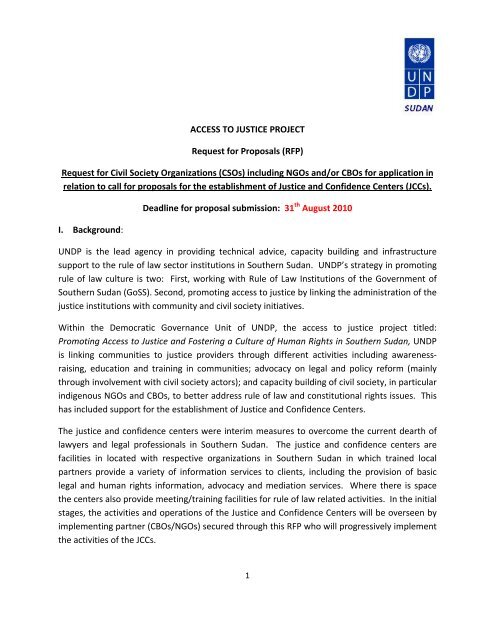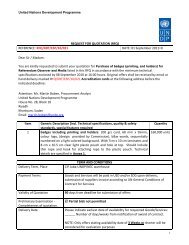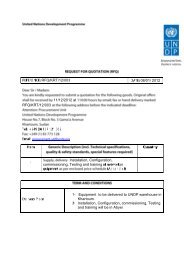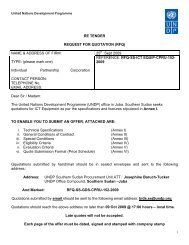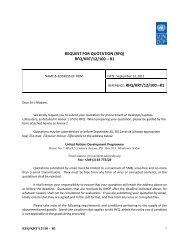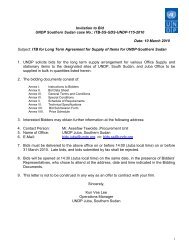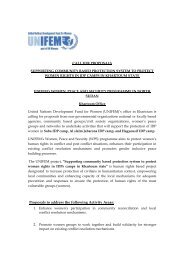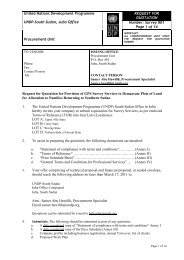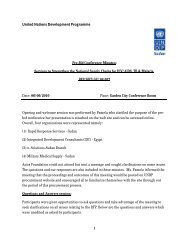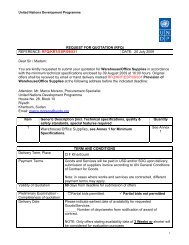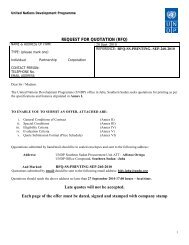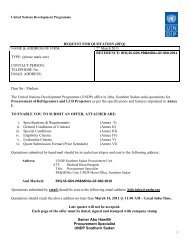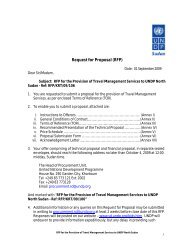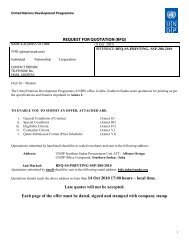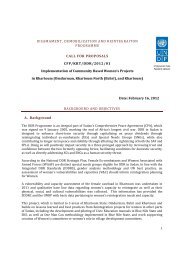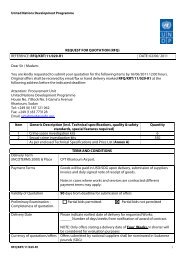Request for Civil Society Organizations (CSOs) - UNDP Sudan Intranet
Request for Civil Society Organizations (CSOs) - UNDP Sudan Intranet
Request for Civil Society Organizations (CSOs) - UNDP Sudan Intranet
Create successful ePaper yourself
Turn your PDF publications into a flip-book with our unique Google optimized e-Paper software.
ACCESS TO JUSTICE PROJECT<br />
<strong>Request</strong> <strong>for</strong> Proposals (RFP)<br />
<strong>Request</strong> <strong>for</strong> <strong>Civil</strong> <strong>Society</strong> <strong>Organizations</strong> (<strong>CSOs</strong>) including NGOs and/or CBOs <strong>for</strong> application in<br />
relation to call <strong>for</strong> proposals <strong>for</strong> the establishment of Justice and Confidence Centers (JCCs).<br />
I. Background:<br />
Deadline <strong>for</strong> proposal submission: 31 th August 2010<br />
<strong>UNDP</strong> is the lead agency in providing technical advice, capacity building and infrastructure<br />
support to the rule of law sector institutions in Southern <strong>Sudan</strong>. <strong>UNDP</strong>’s strategy in promoting<br />
rule of law culture is two: First, working with Rule of Law Institutions of the Government of<br />
Southern <strong>Sudan</strong> (GoSS). Second, promoting access to justice by linking the administration of the<br />
justice institutions with community and civil society initiatives.<br />
Within the Democratic Governance Unit of <strong>UNDP</strong>, the access to justice project titled:<br />
Promoting Access to Justice and Fostering a Culture of Human Rights in Southern <strong>Sudan</strong>, <strong>UNDP</strong><br />
is linking communities to justice providers through different activities including awareness‐<br />
raising, education and training in communities; advocacy on legal and policy re<strong>for</strong>m (mainly<br />
through involvement with civil society actors); and capacity building of civil society, in particular<br />
indigenous NGOs and CBOs, to better address rule of law and constitutional rights issues. This<br />
has included support <strong>for</strong> the establishment of Justice and Confidence Centers.<br />
The justice and confidence centers were interim measures to overcome the current dearth of<br />
lawyers and legal professionals in Southern <strong>Sudan</strong>. The justice and confidence centers are<br />
facilities in located with respective organizations in Southern <strong>Sudan</strong> in which trained local<br />
partners provide a variety of in<strong>for</strong>mation services to clients, including the provision of basic<br />
legal and human rights in<strong>for</strong>mation, advocacy and mediation services. Where there is space<br />
the centers also provide meeting/training facilities <strong>for</strong> rule of law related activities. In the initial<br />
stages, the activities and operations of the Justice and Confidence Centers will be overseen by<br />
implementing partner (CBOs/NGOs) secured through this RFP who will progressively implement<br />
the activities of the JCCs.<br />
1
II. Objectives:<br />
<strong>UNDP</strong> through the access to justice project has supported the establishment of the Justice and<br />
Confidence Centers in Yei, Juba, Rumbek and Aweil. The objective of this project is to identify 3<br />
CBOs/NGOs/ based in Juba, Rumbek and Aweil to establish Justice and Confidence Centers. The<br />
number of locations will be dependent on funding received, and a combination of different<br />
implementing partners may be used to support the different locations. In the target locations,<br />
the selected CBOs will typically undertake the following JCC related activities;<br />
• Constitutional and human rights training and awareness<br />
• Provision of some legal in<strong>for</strong>mation and limited legal advice<br />
• Referrals to legal and psychosocial services as available<br />
• Promotion of traditional and in<strong>for</strong>mal justice systems at community level and customary<br />
court monitoring<br />
• Support to the justice sector meetings and trainings.<br />
The focus of the activities is on service delivery to vulnerable and marginalized populations.<br />
The CBOs will also partner with complementary services such as psycho‐social counseling<br />
services to ensure a holistic support to the justice sector.<br />
III. Expected results:<br />
1. Local partners trained on substantive legal issues: The selected CBOs will train identified<br />
local partners on both substantive human rights and rule of law subjects and advocacy<br />
skills. It is expected that <strong>UNDP</strong> will supply standardized training materials <strong>for</strong> some<br />
substantive areas, while the implementing CBO undertakes the trainings. <strong>UNDP</strong> will<br />
hold the intellectual property rights of training resources and materials developed with<br />
funding from this project, and avoid duplication of ef<strong>for</strong>ts. These resources will be<br />
shared be shared by <strong>UNDP</strong> with all implementing CBOs.<br />
2. Justice and Confidence Centers established and operational: The Implementing CBOs<br />
selected will operate the JCCs within their organizations including advocacy, mediation<br />
and in<strong>for</strong>mation sharing with the rule of law institutions and communities at large.<br />
3. JCCs Operations and delivery of services monitored: Once the selected CBOs have<br />
established the JCCs within their institutional arrangements, they will collaborate with<br />
2
ule of law officers in the field offices, to monitor the operations and delivery of<br />
services.<br />
4. Sustainability strategy developed: The CBOs selected will work closely with <strong>UNDP</strong> and<br />
relevant GoSS rule of law institutions to develop a sustainability plan <strong>for</strong> all the activities<br />
being undertaken at the JCCs including management of the JCCs, operational support,<br />
and community programme implementation. This will involve high level consultations,<br />
coordination and planning with relevant GoSS institutions, community members, other<br />
partner CBOs and <strong>UNDP</strong>.<br />
5. Progress reports prepared and shared: The implementing CBOs will provide two<br />
comprehensive narrative and financial progress reports within the 6 months<br />
implementation period. The implementing CBOs will be provided with an overview of<br />
the in<strong>for</strong>mation required <strong>for</strong> both reports.<br />
Interested parties are requested to submit the following:<br />
The structure and size of the proposal must comply with the following guidelines:<br />
1. Back ground along with the problems that the project intends to address – maximum<br />
half a page.<br />
2. Objectives of the project = the ultimate goal. The objectives may be divided into main<br />
and secondary objectives – maximum half a page.<br />
3. Activities = Activities required to attain the stated objectives – Maximum one page.<br />
4. Target Group and Project Location/s = Identification of beneficiaries and area coverage<br />
of the project – Maximum half a page.<br />
5. Strategies = Strategies and partnership required <strong>for</strong> the effective implementation of the<br />
project activities ‐ Maximum one page<br />
6. Management = Project management team or simple organizational chart of project<br />
management– Maximum half a page.<br />
7. Monitoring, evaluation, financial management, and reporting = quality control, ensuring<br />
sustainability and reporting ‐ Maximum one page.<br />
8. Project duration = Total time required to attain the set objectives including reporting on<br />
the project completion ‐ One paragraph (maximum half a page).<br />
9. Budget = what costs how much ‐ Maximum one page.<br />
10. Work‐plan = Which activities to be per<strong>for</strong>med by when ‐ Maximum one page.<br />
Some other important considerations to be noted by the proponents are:<br />
• The proposals should be realistic, well structured and address the problems stated in<br />
the background of the proposal;<br />
3
• The proposals should be consistent with organizational mandate (objectives) of the CSO<br />
and professional skills and work experience of its staff;<br />
• Roles and responsibilities of all staff and partner organizations should be clearly spelled<br />
out (i.e. planning, implementing, monitoring and evaluation);<br />
• The proposals should include realistic monitoring and evaluation plans capturing<br />
especially the impact on the targeted groups.<br />
• The proposal should include cash flow calculations <strong>for</strong> the whole duration of the project<br />
implementation and at least <strong>for</strong> 12 months after the completion as well as future plans<br />
<strong>for</strong> ensuring sustainability.<br />
• The proposal should include a plan <strong>for</strong> monitoring and assessment of impacts.<br />
The proponents should take into account of the following in relation to the<br />
budget:<br />
• Separate budget should be prepared <strong>for</strong> each project locations that the proponent<br />
wants to work in;<br />
• must be prepared in <strong>Sudan</strong>ese Pounds<br />
• must not exceed 27,000 <strong>Sudan</strong>ese Pounds (approximately US$ 10,000 while converted);<br />
• must be detailed, complete, rational and realistic;<br />
• the administrative cost must not exceed 25% of the total proposed amount;<br />
• following the selection of grant recipients, the <strong>UNDP</strong>/Access to Justice Project team may<br />
provide necessary guidance <strong>for</strong> the revision of the budget into <strong>UNDP</strong> <strong>for</strong>mat, if required.<br />
IV. Grant size and project duration:<br />
• One or more grants ranging from $2,000 to $10,000 will be made to different<br />
organizations within a 12 month period ‐ per project location. The amount of grants<br />
awarded will depend on the quality of proposals received and the amount of available<br />
donor funds.<br />
• <strong>UNDP</strong>/Access to Justice Project may call <strong>for</strong> a second round of proposals depending<br />
upon the availability of funds. Grants will be given in <strong>Sudan</strong>ese Pounds at the UN<br />
exchange rate of the day of the funds transfer and to the grant winner’s bank account.<br />
• Duration of the project should be from 3 to 12 months.<br />
4
V. Scope of Work and Expected Output<br />
Scope of work:<br />
CBOs/NGOs are requested to submit a proposal as a potential implementing partner in one of the<br />
project locations (Aweil, Rumbek and Juba) in Southern <strong>Sudan</strong>. This is a request <strong>for</strong> proposal only<br />
and it should not be misconstrued in any way to mean an offer of entering into an agreement<br />
with the proponent. The proposals will be subjected to a transparent evaluation based on pre‐<br />
determined <strong>UNDP</strong> criteria.<br />
The implementation of JCCs activities will be carried out by local <strong>CSOs</strong> which will receive small<br />
grants from <strong>UNDP</strong> to implement the proposed activities. This will include activities such as:<br />
Constitutional and human rights training and awareness; Provision of some legal in<strong>for</strong>mation<br />
and limited legal advice; Referrals to legal and psychosocial services as available; Promotion of<br />
traditional and in<strong>for</strong>mal justice systems at community level and customary court monitoring;<br />
and Support to the justice sector meetings and trainings.<br />
• It is anticipated that community members will benefit from activities that ensures<br />
access to justice and rule of law;<br />
• Community networks will be enhanced by linking the justice claimants with rule of law<br />
stakeholders and other organizations/institutions that can provide support services;<br />
VI. Duties and responsibilities<br />
Under the direct guidance and supervision of the Access to Justice Project Manager, and<br />
working closely with Access to Justice rule of law officers based in the field, the CSO/s will<br />
provide the following:<br />
i. Constitutional and human rights training and awareness<br />
ii. Provision of legal in<strong>for</strong>mation and <strong>for</strong>m of legal advice<br />
iii. Referrals to legal and psycho‐social services as available<br />
iv. Promotion of advocacy, peace building, mediation and Alternative Dispute Resolution (ADR)<br />
activities.<br />
v. Promotion of traditional and in<strong>for</strong>mal peace building, mediation at community level and<br />
customary court monitoring<br />
vi. Provision of a venue <strong>for</strong> justice sector meeting and trainings<br />
5
vii. Provide monthly and quarterly financial and progress reports including<br />
recommendations to address programme/operational challenges; and provide a final<br />
narrative and financial report at the end of the Project.<br />
VII. Grant applications review process:<br />
Proposals will be reviewed by a Grants Committee composed of representatives from various<br />
<strong>UNDP</strong> units and Access to Justice Project and the final approval by <strong>UNDP</strong> Management.<br />
Each proposal will be given score from 0 to 100 as indicated below:<br />
Technical Evaluation (90 score)<br />
1. Consistency with Justice and Confidence Centers objectives – (15).<br />
The proposal should address issues of access to justice and rule of law.<br />
2. Likelihood of success and project feasibility/sustainability – (15).<br />
The proposal should clearly demonstrate sustainability during the grant period without any<br />
external funding.<br />
3. Capacity of the organization to implement the project (institutional, financial) – (20).<br />
The CSO should demonstrate the ability to effectively manage grant funds as well as the<br />
institutional capacity (equipment, facilities, and past record of managing such projects)<br />
necessary <strong>for</strong> project implementation.<br />
4. Comprehensiveness of the project description – product, plan and budget (20).<br />
The proposal should clearly define its strategy <strong>for</strong> implementation detailing a step‐by‐step<br />
project plan and itemized budget, target groups, and clear timelines <strong>for</strong> activity duration.<br />
5. Competence of the organization’s staff. Previous experience in related fields, availability<br />
of skills and training – (20).<br />
Financial Evaluation (10 score)<br />
The budget should be detailed, complete, rational and realistic, and must not exceed 27,000<br />
<strong>Sudan</strong>ese Pounds (approximately US$ 10,000 while converted).<br />
Administrative costs exceeding 25% of the total proposed amount will be rejected.<br />
6
The CSO should demonstrate competent project management skills, experience and successful<br />
implementation of similar projects, competent technical staff with relevant professional and<br />
educational background.<br />
VIII. Reporting, monitoring and evaluation<br />
Reporting under grants<br />
Grantees will be expected to present updates and financial reports, with documented proof of<br />
data on the project progress and expenses from grant funds. Minimum reporting requirements<br />
will include the inception report, mid‐term progress report and project completion report.<br />
Furthermore, an evaluation of the grant scheme will be undertaken at the end of its cycle in<br />
order to review lessons learned and assess impact to date. Reporting under the Grants will be<br />
to the Access to Justice Project Manager.<br />
Monitoring<br />
The Access to Justice Project Manager or his/her designate will undertake periodic visits<br />
to the project sites, as well as participate in the events organized by grant winners. If<br />
challenges occur in the course of project implementation the Access to Justice Project<br />
Management, together with the Grants Committee, will provide assistance and<br />
consultations to resolve problems and facilitate smooth implementation of the project.<br />
Project evaluation<br />
The Access to Justice Project will pay special attention to evaluation of project results.<br />
There<strong>for</strong>e, the inclusion of both qualitative and quantitative indicators is recommended in the<br />
project design as this will help to track and assess results of the project implementation.<br />
Where necessary the Project will undertake an external evaluation of individual grants or<br />
groups of grants. Results of such evaluations will be made available to grant winners of this<br />
program as well as to other interested parties.<br />
IX. Experience required<br />
The proponent CBO/NGO must submit the following documents along with the proposal:<br />
a) proof of registration as a non‐governmental non‐commercial organization (copies of the<br />
registration certificate and bylaws/constitution to be attached with the application);<br />
b) Organizational profile with following details;<br />
7
• a clearly defined management structure;<br />
• experience and expertise in training and capacity building;<br />
• knowledge of international human rights norms and experience of working on<br />
human rights and protection issues,<br />
• work experience in Southern <strong>Sudan</strong> or in post conflict situations <strong>for</strong> at least two<br />
years prior to the application,<br />
• details of the local partners if jointly applied by two or more than two <strong>CSOs</strong>.<br />
c) Curriculum Vitae of the two key staffs proposed <strong>for</strong> the implementation of the Project.<br />
X. Submission of Proposals<br />
Proposals can be submitted by local <strong>Civil</strong> <strong>Society</strong> <strong>Organizations</strong>/Non‐Governmental<br />
<strong>Organizations</strong> based in Southern <strong>Sudan</strong> to the <strong>UNDP</strong> main Offices or by email as detailed bellow<br />
no later than 31 th August 2010, 17:00 Hours.<br />
Attention: Project Manager<br />
Rule of Law Cluster<br />
<strong>UNDP</strong>, Juba<br />
Southern <strong>Sudan</strong><br />
Email: emmanuel.joof@undp.org<br />
Cc; hesborn.onyango@undp.org<br />
If request is made <strong>for</strong> additional in<strong>for</strong>mation or any clarification by a CSO, <strong>UNDP</strong>/Access to<br />
Justice Project would endeavor to provide the same as soon as possible, but any delay in<br />
providing such in<strong>for</strong>mation will not be considered as a reason <strong>for</strong> extending the submission<br />
date of the proposals.<br />
8


